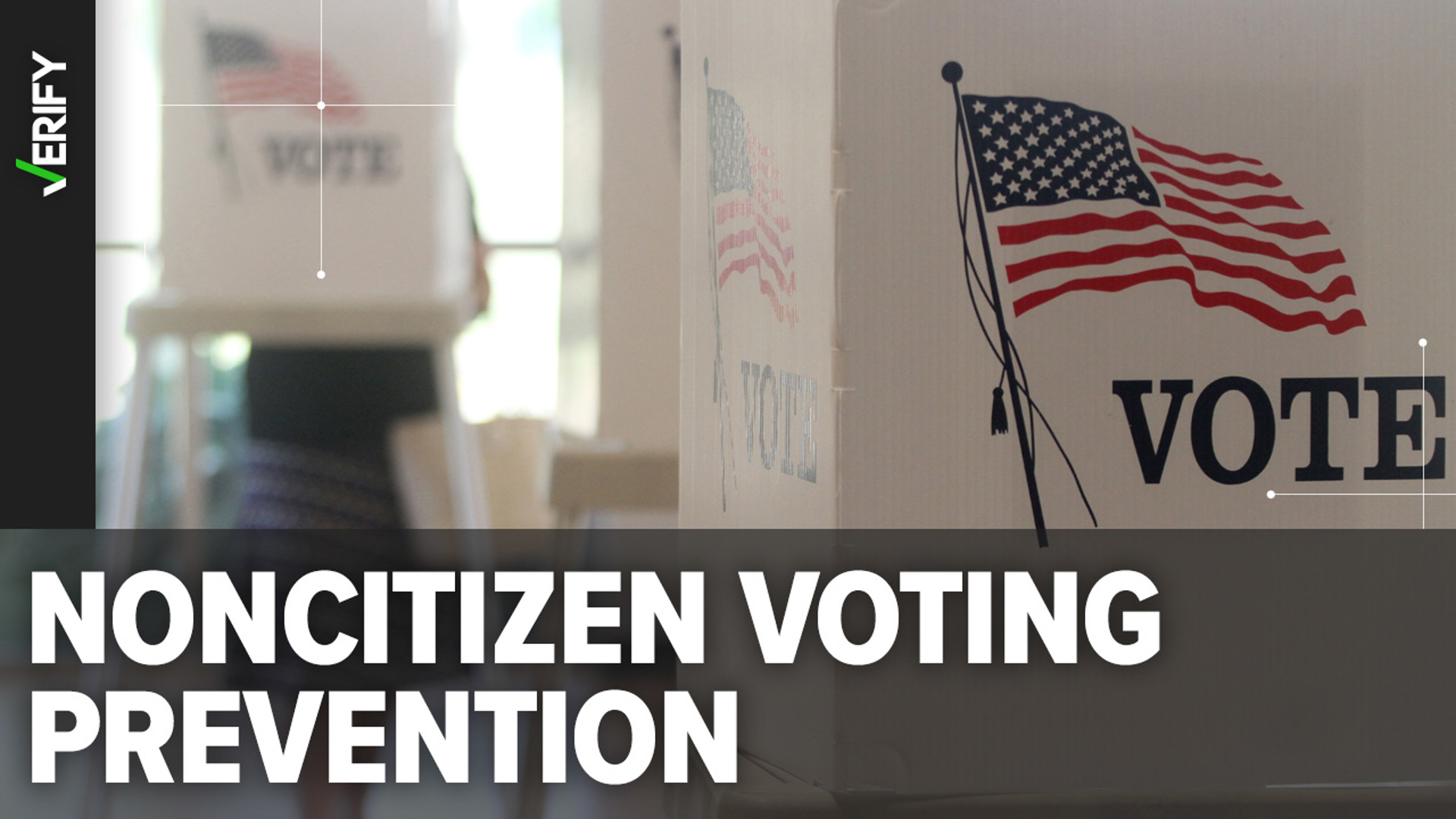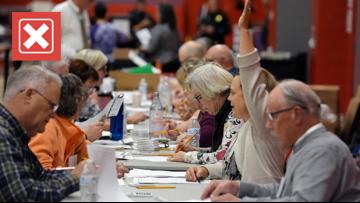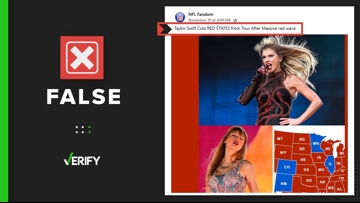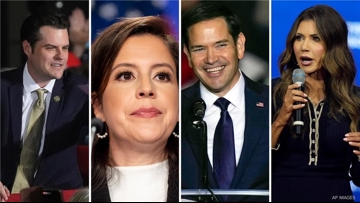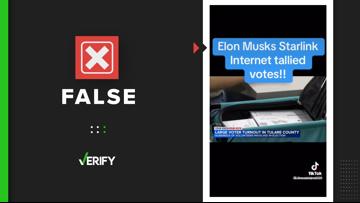Border security and immigration have been among the most talked about issues in the lead-up to the November 2024 presidential election, and some have linked those issues to voting. That includes former President Donald Trump, who has said at his rallies that Democrats want to sign undocumented immigrants up to vote.
U.S. citizens are the only people permitted by federal law to vote in federal elections, which include elections for president, the U.S. Senate and the U.S. House of Representatives. All states also prohibit anyone who isn’t a citizen from voting in state elections, like those for governor or the state legislature.
Local elections are the lone exception to citizen voting requirements, although only a few municipalities across the country allow noncitizens to vote. Still, the different rules for federal, state and local elections can make it hard to understand what measures are in place to counter voter fraud.
VERIFY has received dozens of reader questions asking how states stop undocumented people and other noncitizens from voting in federal elections.
THE QUESTION
Do states have safeguards in place to keep undocumented people from voting in federal elections?
THE SOURCES
Stephen Richer, the Maricopa County, Arizona recorder
Spokesperson for the Pennsylvania Department of State
Spokesperson for the Wisconsin Elections Commission
National Voter Registration Act of 1993 and Immigration Control and Financial Responsibility Act of 1996
THE ANSWER
Yes, states have various safeguards in place to keep undocumented people from voting in federal elections. While there have been instances of noncitizens attempting to vote illegally, it’s incredibly rare.
WHAT WE FOUND
Since 1924, it has been a crime in all 50 states for a noncitizen to vote in a federal or state election, according to the National Immigration Forum.
And since the Immigration Control and Financial Responsibility Act of 1996 became law, it has also been a federal crime for noncitizens to vote in federal elections. The law defines federal elections as those for president, senator and representative. Anyone violating that law could face a fine, up to one year in federal prison and deportation, plus the penalties of whatever state crimes they’ve violated.
Some municipalities allow noncitizens to vote in certain local elections. These municipalities are listed here.
Election officials don’t rely on the law alone to keep undocumented people from voting. They also have measures in place to prevent ineligible people from voting.
One of the most common ways to prevent undocumented people from voting is by requiring an ID, such as a driver’s license, at the polls. While some states allow undocumented people to obtain driver’s licenses or state IDs, election officials in these states have other measures in place to prevent them from actually voting.
This includes using systems that do not allow people with noncitizen IDs to register, regular checks of voter rolls and laws that allow voters to challenge the eligibility of other voters.
Even with all these built-in protections, there have been some cases of undocumented people attempting to vote. But elections officials say those rare cases are not widespread enough to impact the results of federal elections.
“Research shows attempted voting by noncitizens in federal elections is extremely rare,” the Michigan Department of State says. Any noncitizen, both undocumented and lawfully present, could face prison time or be deported if they attempt to vote.
The Michigan Department of State cites a study by the nonpartisan Brennan Center for Justice and data from the Heritage Foundation, a conservative think tank. The Brennan Center found 30 instances of noncitizens voting among 23.5 million analyzed votes in 2016. The Heritage Foundation identified 129 proven incidents of noncitizens registering to vote or casting a ballot in the last 21 years.
A spokesperson for the Wisconsin Election Commission (WEC) emphasized that “there is not evidence to support the idea that noncitizens are voting in Wisconsin in significant numbers.”
Since the creation of the WEC in 2016, the agency has been made aware of four alleged instances of noncitizens attempting to vote in Wisconsin, the WEC spokesperson said. One of these allegations was in 2017, one was from 2019, and two were in 2023.
Voter Registration
When a person registers to vote, federal law mandates they sign a form attesting to their citizenship under penalty of perjury.
“These are public documents and are saved after each election, creating a preserved record,” the Michigan Department of State says. “Penalties for false statements may include prison time, fines, and deportation.”
This record and the penalty of perjury are themselves safeguards against undocumented people unlawfully voting. Not only does the penalty threaten a person unlawfully in the U.S. with deportation, but registering to vote lets the government know that the person is in the U.S., increasing the risk of being caught and deported.
“Given the consequences, it’s not surprising that noncitizens are unlikely to intentionally register or try to vote,” the Michigan Department of State says.
Federal law does not require a voter to provide proof of citizenship at the time of registration beyond the voter’s own attestation. But some states do have laws in place that require it.
Arizona is one such state, according to Stephen Richer, the Maricopa County recorder. Richer explained on X that Arizona both requires proof of citizenship to register to vote and to obtain a driver’s license, with the exception of a type of license granted to noncitizens lawfully in the United States. So state election officials often use data from Arizona’s Motor Vehicle Division to confirm a voter’s citizenship.
Voters in Arizona who do not or cannot provide proof of citizenship at registration go on a list that limits the elections they can vote in and aren’t given full voting rights until the state can verify their citizenship.
All states except for North Dakota require a voter to be registered before they’re allowed to vote. That means before someone can vote, they must have completed the registration process and provided the required documentation. That usually must be done in advance of Election Day, although some states do allow same-day registration. In North Dakota, a valid ID is still required at the polls.
So if an undocumented person heads to a polling place on Election Day, they’ll be turned away when they’re unable to provide their voter registration or proof of citizenship.
DMV Registration
State departments of motor vehicles will typically offer the option to register or automatically register people to vote when they get driver’s licenses. A number of states allow noncitizens to obtain IDs issued by their department of motor vehicles, but those states have systems in place so those people are also not registered to vote at the same time.
For example, in Pennsylvania, “individuals applying with PennDOT for a new or updated driver’s license or identification must provide certain documentation confirming, among other things, their age, residency, and citizenship status,” a spokesperson for the Pennsylvania Department of State said. “Although citizenship is not required to obtain a license, anyone who provides documentation to PennDOT indicating that they are not a citizen is automatically screened out and therefore is never presented with the voter-registration application process.”
Michigan’s Department of State also makes it clear that owning a state driver’s license or ID does not mean a person can register to vote. A person must be able to prove they’re a citizen before its system will allow someone with a state ID to register to vote.
“Michigan’s computerized system for driver’s license or state ID applications does not allow an applicant to be registered to vote if they provide noncitizen documents – it’s not even an option,” the state’s Department of State website says. “Secretary of State employees can’t override the system or add them to the voter registration list another way.”
Voter Registration List Maintenance
If someone ineligible to vote, like an undocumented person, somehow gets registered to vote, it’s not guaranteed they’ll remain on the voter rolls until Election Day. The National Voter Registration Act of 1993 requires states to routinely check their voter registration rolls for accuracy and remove anyone it finds should not be registered to vote.
These audits add an extra line of defense, and help catch people who should not have been registered in the first place
States can use cross-state databases, Social Security data, U.S. Postal Service data, felony records, death records and property deeds to verify the accuracy of their voter registration lists, the Election Assistance Commission says.
Eight states also use jury list dismissals to help verify the citizenship of registered voters, the National Conference of State Legislatures (NCSL) says. Noncitizens cannot serve on juries and are therefore routinely dismissed from jury lists.
Social Security Checks
The Help America Vote Act of 2002 requires states to verify the registration information of newly registered voters for federal elections, the Social Security Administration (SSA) says. This means verifying that the voter’s name, date of birth and Social Security number match SSA records, according to the law’s text.
People who are not lawfully present in the U.S. cannot receive Social Security numbers.
States must first attempt to verify this information with their motor vehicle administration, and may then check Social Security data if the registered voter does not have a driver’s license.
“The Pennsylvania Department of State uses the Help America Vote Verification to check partial social security numbers (SSN) not only for voter registration applications, but also for absentee and mail ballot applications,” the Pennsylvania Department of State spokesperson said. “In many cases, the same voter’s partial SSN is being checked more than once in a single year.”
This helps states catch people attempting to register with the information of a deceased person or with information that is otherwise not their own.
State election officials are then able to use these checks to remove deceased voters, people whose registration information doesn’t match SSA records and people who are mistakenly registered twice or in more than one state from the voter rolls.
Election Day
States have more protections against illegal voting by undocumented people on Election Day itself. One of the more common methods is by having a voter prove their identity and citizenship status at the polls by requiring voters to provide an ID.
In Pennsylvania, people requesting mail-in ballots, first-time voters, and people voting at a new polling place must provide an ID to be able to vote.
And in Pennsylvania, people unlawfully in the U.S. are not permitted to have state IDs, and thus wouldn’t be able to legally provide one at the polls.
Another safeguard available in some states on Election Day is the ability to challenge individual voters. Depending on the state, the challenged voter may have to verify their information and their ballot may then be set aside for additional review if it is still cast.
For example, Wisconsin allows voters or appointed election inspectors to challenge another person’s attempt to vote if the challenger has cause to believe the other voter is not a citizen or doesn’t meet the other criteria to legally vote.
“If challenged, an individual will be required to swear an oath and will answer questions so that the individual’s eligibility to vote can be confirmed,” a spokesperson for the Wisconsin Elections Commission (WEC) told VERIFY. “If the individual refuses to take the oath, refuses to answer the questions, or if the answers indicate that the individual is not qualified, the individual will not be allowed to vote. An individual’s race, ethnicity, heritage, or English language proficiency alone, without more, can never constitute cause to bring a challenge to an elector’s voting qualifications.”
A person who is challenged, swears an oath and answers questions confirming their eligibility to vote can cast a ballot, but it will be marked for review by a board of canvassers before being counted, according to Wisconsin law.
Election officials also review mail-in ballots by verifying if the information and signature on the ballot envelope matches what’s on the voter’s file, according to the Center for Election Innovation & Research (CEIR).
